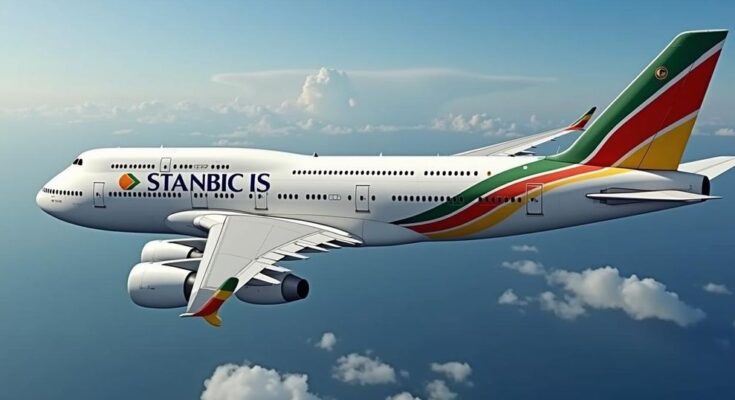A senior official from the Bank of South Sudan has testified that Stanbic Bank’s withholding of $7.2 million from Air Afrik Aviation, citing insufficient funds in a nostro account, was unjustified. This led to the airline suing Stanbic, claiming that their actions resulted in a terminated $20 million leasing agreement with the South Sudan government. Stanbic maintains that there were no available funds to support the credit. The outcome of this legal dispute may influence banking practices in the region.
A senior official from the Bank of South Sudan (BoSS) has asserted that Stanbic Bank credited the account of Air Afrik Aviation with an amount totaling $7.2 million in 2016, only to subsequently withhold the funds, citing insufficient balances in a nostro account as the reason. Mr. Chan Andrea Chan, who currently serves as the director of the financial market department at BoSS, stated that the argument presented by Stanbic is unfounded as the nostro account in question had no direct relation to the funds earmarked for Air Afrik Aviation. In his testimony before Justice Nixon Sifuna, Mr. Chan emphasized that Stanbic should have refrained from crediting the airline’s account until sufficient funds were available in the nostro account, which should have established a clear connection between the beneficiary and the account. “I reiterate that the nostro account had no connection with the subject transaction for the transfer of $7.2 million. These are issues to be dealt with between Stanbic and BoSS in the general course of doing the business of banking,” he declared. The airline, Air Afrik, has taken legal action against Stanbic Bank after having its funds frozen, which they allege resulted in the termination of a crucial leasing agreement with the South Sudan government. The leasing contract, valued at $20 million and signed on September 4, 2014, was jeopardized due to the airline’s inability to fulfill its obligations following the withdrawal of these funds. Mr. Chan insisted that Stanbic’s actions were contradictory; despite not rejecting the credit advice, they proceeded to credit Air Afrik’s account and subsequently reversed the transaction without adequate justification. He criticized the bank’s failure to either return the funds to BoSS immediately or request additional funds to cover the transfer. “A nostro account generally handles funds for different transactions. If the funds were not sufficient, Stanbic Bank should either have returned the funds to BoSS immediately or requested for replenishment…” he stated. In response to the claims, Stanbic Bank has maintained that the credit was reversed because the South Sudan government’s credit note was insufficient due to a lack of funds.
The issue pertains to a legal dispute between Air Afrik Aviation and Stanbic Bank regarding a $7.2 million transaction that resulted in the airline suing the bank for breaching regulations. The funds were initially credited by Stanbic but subsequently withheld under the premise that the associated nostro account lacked sufficient funds. A nostro account is crucial in this context, as it represents a bank account held in another country, and any absence of funds on this account might affect transactions. Air Afrik’s operations and potential contracts were seriously impacted by this transaction, leading to significant financial losses and legal recourse due to the alleged improper handling of the funds by Stanbic.
In summary, the dispute underscores significant banking practices and the responsibilities financial institutions hold towards their clients. The testimony from Mr. Chan highlights the intricacies involved in international banking transactions and the repercussions of poor fund management, which led to substantial operational setbacks for Air Afrik. The resolution of this case could have implications for future banking regulations and the operational conduct of financial institutions dealing in international funds.
Original Source: www.theeastafrican.co.ke




